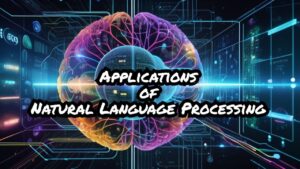Applications of Natural Language Processing in Everyday Life
Natural language processing (NLP) is a branch of artificial intelligence that allows computers to understand, interpret, and manipulate human language. NLP has become deeply integrated into many products and services we use every day. From virtual assistants like Siri and Alexa to movie and product recommendations on Netflix and Amazon, NLP algorithms help analyze language and respond appropriately. As the Artificial Intelligence Course continues to advance NLP, we can expect even more practical applications to emerge that make our digital lives more productive and enjoyable. NLP is making AI services an indispensable part of our everyday routine.

Alt Text- > Applications of Natural Language Processing in Everyday Life
Table of Contents:
- Introduction to Natural Language Processing (NLP)
- NLP in Personal Assistants like Siri and Alexa
- NLP in Language Translation Services
- NLP in Social Media Sentiment Analysis
- NLP in Email Spam Filtering
- NLP in Customer Service Chatbots
- NLP in Search Engine Optimization (SEO)
- NLP in Healthcare for Clinical Documentation
- NLP in News and Content Curation
- NLP in Virtual Mental Health Support
Introduction to Natural Language Processing (NLP)
Natural Language Processing (NLP) is a branch of artificial intelligence that focuses on the interaction between computers and humans using natural language. It enables computers to understand, interpret, and generate human language, making it a crucial technology in various applications across different industries. NLP algorithms analyze text and speech data to extract meaningful insights, enabling a wide range of applications in everyday life.
NLP in Personal Assistants like Siri and Alexa
Personal assistants like Siri and Alexa have become ubiquitous in our daily lives, providing us with convenient ways to interact with technology using natural language. These assistants leverage NLP to understand user queries, perform tasks, and provide responses in a human-like manner. By processing and analyzing spoken language, they can execute commands, answer questions, set reminders, and even control smart home devices, making them valuable tools for enhancing productivity and convenience.
NLP in Language Translation Services
Language translation services have been revolutionized by NLP technologies, enabling seamless communication across different languages. NLP algorithms can accurately translate text and speech from one language to another, breaking down language barriers and facilitating global interactions. Platforms like Google Translate use NLP to provide instant translations, making information accessible to a wider audience and fostering cross-cultural communication.
NLP in Social Media Sentiment Analysis
Social media platforms generate vast amounts of textual data that can be analyzed using NLP techniques for sentiment analysis. By applying NLP algorithms to social media posts, comments, and reviews, businesses and organizations can gain valuable insights into public opinion, trends, and customer feedback. Sentiment analysis helps in understanding user sentiment, identifying customer preferences, and improving brand reputation through targeted marketing strategies.
NLP in Email Spam Filtering
Email spam filtering is another area where NLP plays a crucial role in enhancing user experience. NLP algorithms can analyze the content of incoming emails to classify them as either spam or legitimate messages. By identifying patterns, keywords, and suspicious elements in email content, NLP-powered spam filters can effectively block unwanted messages, reducing inbox clutter and enhancing email security for users.
NLP in Customer Service Chatbots
Customer service chatbots leverage NLP to provide automated assistance and support to users in real-time. These chatbots can understand and respond to user queries, resolve issues, and provide relevant information using natural language interactions. By incorporating NLP capabilities, businesses can offer efficient customer service round the clock, improving customer satisfaction and streamlining support processes.
NLP in Search Engine Optimization (SEO)
NLP plays a vital role in Search Engine Optimization (SEO) by helping search engines understand and rank web content based on user queries. NLP algorithms analyze the relevance and quality of web pages, extract keywords, and optimize content for search engines to improve visibility and organic traffic. By incorporating NLP techniques in SEO strategies, websites can enhance their search engine rankings and reach a wider audience online.
NLP in Healthcare for Clinical Documentation
In the healthcare industry, NLP is used for clinical documentation to streamline processes and improve patient care. NLP algorithms can extract and analyze information from medical records, notes, and reports, enabling healthcare professionals to quickly access relevant patient data. By automating documentation tasks, NLP helps healthcare providers save time, reduce errors, and enhance the efficiency of medical services.
NLP in News and Content Curation
NLP technologies are employed in news and content curation platforms to analyze, categorize, and personalize content for users. By understanding the context and meaning of text, NLP algorithms can recommend relevant articles, news stories, and multimedia content based on user preferences and interests. Content curation powered by NLP enhances user engagement, increases content relevance, and improves the overall user experience.
NLP in Virtual Mental Health Support
Virtual mental health support services utilize NLP to provide personalized and confidential assistance to individuals seeking mental health resources. NLP-powered chatbots and applications can engage with users in natural language conversations, offer emotional support, and provide resources for mental well-being. By leveraging NLP in virtual mental health support, individuals can access mental health resources conveniently and confidentially, promoting emotional well-being and self-care.
In conclusion, Natural Language Processing (NLP) has transformed the way we interact with technology and the world around us, offering a wide range of applications in everyday life. From personal assistants and language translation services to healthcare documentation and mental health support, NLP technologies continue to enhance efficiency, convenience, and accessibility across various industries. As NLP capabilities evolve and improve, we can expect to see even more innovative applications that leverage the power of natural language understanding to enrich our daily experiences.
Author Profile

-
Hi I am Karan a passionate blogger. It's almost 4.5 years when I started blog writing in 2019. I am the owner of the Readree.com. My dedication to delivering reliable information and useful tips has earned him a loyal following among tech enthusiasts seeking reliable insights and recommendations.
If You have any query then email Us. sabinbaniya2002@gmail.com
Latest entries
 AppsApril 19, 2025Transfer Money from Bajaj EMI Card to Mobikwik Wallet
AppsApril 19, 2025Transfer Money from Bajaj EMI Card to Mobikwik Wallet TECH NEWSApril 15, 2025What is Bike Pink in Rapido?
TECH NEWSApril 15, 2025What is Bike Pink in Rapido? ArticleApril 9, 2025Top 10 Whisky Brands in India Under 5000 – Indian Whisky Brands
ArticleApril 9, 2025Top 10 Whisky Brands in India Under 5000 – Indian Whisky Brands How ToApril 3, 2025How Many Passengers Are Allowed in a Rapido Cab?
How ToApril 3, 2025How Many Passengers Are Allowed in a Rapido Cab?